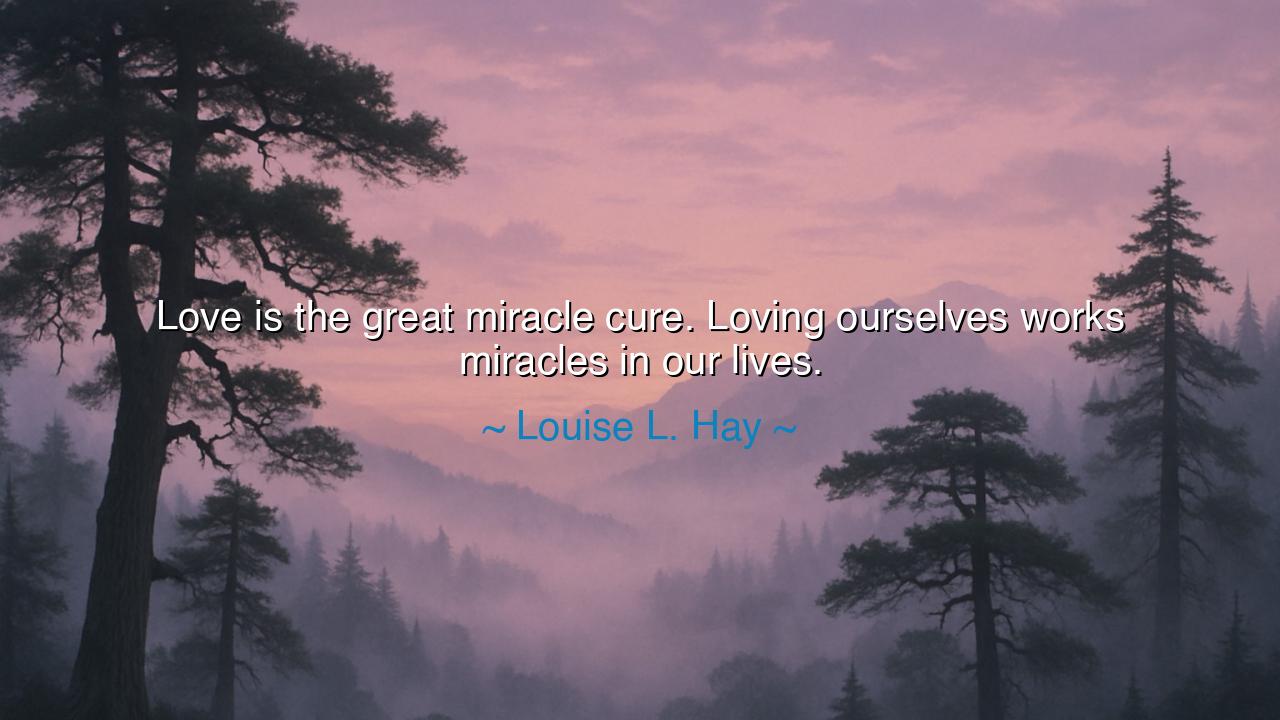
Love is the great miracle cure. Loving ourselves works miracles






“Love is the great miracle cure. Loving ourselves works miracles in our lives.” Thus spoke Louise L. Hay, the teacher of healing and self-compassion, whose words have restored light to countless weary souls. Her wisdom shines with the quiet radiance of eternal truth—that love, especially the love we direct inward, is the most powerful medicine ever known. In an age that teaches us to seek worth in approval, in achievement, or in perfection, her voice rises like a timeless bell, reminding us that the first and greatest healing begins not in the world outside, but in the sanctuary of our own hearts.
When Hay speaks of love as the great miracle cure, she does not speak in metaphor alone. She speaks of a power that transcends medicine, circumstance, and time. Love transforms because it aligns the heart with truth. Where fear divides, love unites; where guilt chains, love frees. It dissolves the poisons of resentment and shame, replacing them with gentleness and peace. For every wound we carry—emotional, physical, or spiritual—is, in its essence, a place where love has been forgotten. And when love returns, the wound begins to close. Thus, she declares, to love ourselves is not vanity—it is healing, for only by embracing who we are can we release the pain that has bound us.
Louise Hay’s insight was not born of theory but of experience. She herself walked through suffering’s shadow. In her early life, she endured abuse, poverty, and disease, yet she discovered that no outer darkness could conquer a heart filled with self-acceptance and forgiveness. Diagnosed with cancer, she turned not first to despair but to inner transformation—forgiveness of her past, gentleness toward herself, gratitude for life. In time, she healed, not by miracle of chance, but by the miracle of love. Her recovery became a living testament to the truth she taught: that the mind and spirit, when aligned with love, possess the power to renew even the body.
In her teaching, there echoes the wisdom of the ancients. The philosopher Plato wrote that love is the force that “binds the universe together.” The Buddha spoke of compassion as the path to enlightenment, and Jesus declared that the greatest commandment is to “love thy neighbor as thyself.” Yet what most forget, as Hay reminds us, is that these words begin within. One cannot truly love others while despising oneself, just as one cannot pour water from an empty vessel. The origin of healing lies in self-acceptance, for when a soul learns to love itself—its flaws, its history, its imperfection—it ceases to war with its own being. And from that peace, miracles arise naturally.
We see this same truth reflected in countless lives. Consider the story of Nelson Mandela, who emerged from twenty-seven years of imprisonment without bitterness, carrying instead a heart full of forgiveness. His power to unite a divided nation sprang from the same well of love Louise Hay speaks of—a love not dependent on circumstance, but born from a deep inner peace. Love transformed his suffering into purpose, his pain into compassion. In this, as in Hay’s life, we see that love is not weakness, but the highest strength—the force that makes impossible things possible.
The lesson, then, is both profound and practical: if you would change your life, begin by changing how you see yourself. Speak to your heart as you would to a child—gently, kindly, with patience. When you make mistakes, forgive yourself quickly; when you succeed, rejoice sincerely. Feed your mind with gratitude and your spirit with compassion. Each act of self-love sends ripples outward, transforming not only you but all who encounter your light. For the one who loves themselves truly becomes, by their very being, a healer of others.
So, my child, remember this sacred truth: the miracle you seek does not lie in distant stars or hidden temples—it lives within your own chest, beating softly beneath your ribs. Love yourself, not as the world demands, but as creation itself intended—with reverence, with grace, with joy. In time, you will see what Louise Hay saw: that love does not merely mend wounds—it creates life anew. And when you have learned to love yourself fully, you will discover that you are not merely healed—you have become the miracle itself.






AAdministratorAdministrator
Welcome, honored guests. Please leave a comment, we will respond soon